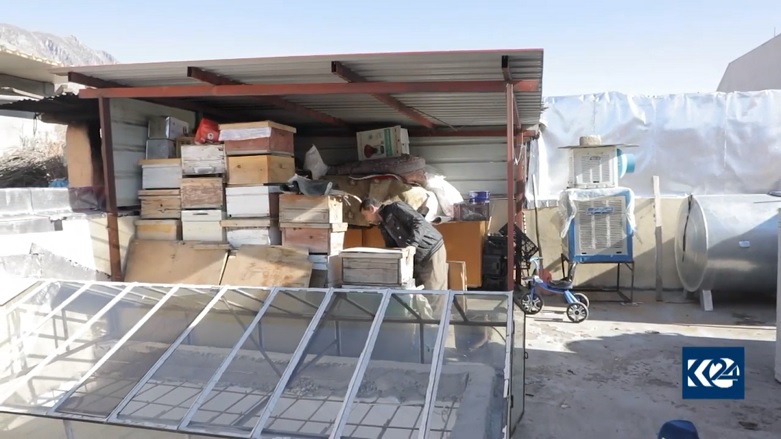Turkish-PKK clashes have cost the Kurdistan Region's Amedi district nearly $62 million
Turkish-PKK clashes have cost the Kurdistan Region's Amedi district nearly $62 million

ERBIL (Kurdistan 24) – The decades-long conflict between Turkey and the Kurdistan Workers’ Party (PKK) that has in recent years been centered in the Kurdistan Region has of late resulted in almost $62 million in direct damage and loss of agricultural income in the Amedi district, according to residents.
Primarily affected among local agriculture was this year's production of honey, popular with consumers throughout the Kurdistan Region and Iraq. Beekeepers are concerned that the ongoing warfare will bring an end to the trade on which many rely as a crucial source of livelihood.
“I lost nearly 53 beehives in a Turkish warplane strike near my house in Redinia village in Deraluk. This cost me over $10,000.” honey producer Mohammed Lazgin told Kurdistan 24.
“This forced me to move my remaining beehives closer to the district center, drastically reducing my production and the quality of the honey, causing my business to suffer.”

“Bees tend to produce better and more honey in the mountains where my home village is located on the outskirts of Deraluk subdistrict, however now I barely make enough to live on,” Lazgin added.
Hoshyar Jasim, who has been keeping bees for his primary livelihood for fifteen years, said that since he, as well, had to move to the Sheladzi subdistrict because of airstrikes and that both the amount and quality of his honey has been reduced by two thirds.
“Turkish warplanes were often hovering over our village for 24 hours a day. With no guarantees on our lives, we were forced to relocate to the cities, which is very difficult for our business,” he explained.
Jasim pointed out that airstrikes had in the past struck as close as 50 meters from his home, making it unsafe for his family.
“Before the conflict, I was producing over 350 kilograms of honey each year. Now I’m making between 60 to 80 kilograms in the same period of time,” he explained, requesting also that PKK fighters withdraw from all civilian-populated areas.
In the past decade, Ankara has regularly shelled areas inside the Kurdistan Region as part of the conflict the PKK has fought over Kurdish rights in Turkey, but operations this year have intensified and widened in terms of scope and territory covered. In some areas, Turkish forces have mobilized as far as 30 kilometers deep inside the autonomous region’s border.
As civilians, agriculture, trade, and the local environment continue to suffer from the clashes, residents and Kurdistan Regional Government (KRG) officials have repeatedly asked the PKK and the Turkish government to take their fight elsewhere.
Aside from civilian casualties, the loss of multiple crops and other agricultural products in Amedi alone has included more than 1,500 beehives, causing more than 750 million IQD ($62 million) throughout the rural district.
Editing by John J. Catherine